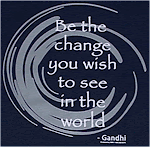By Onnesha Roychoudhuri
AlterNet
Friday 28 April 2006
Robert Scheer has reported on every administration since Richard Nixon. But as he says in this interview, he never expected the lies and cynicism of Bush II.
With over 65 percent of Americans disapproving of our current president, why can't we get some credible opposition in Washington? As we head towards midterm elections, and look ahead to those of 2008, it's a question that is weighing heavily on millions of American minds.
Two longtime observers of our increasingly corrupt political system, Robert Scheer and Joe Klein have written books documenting the causes and the consequences. After 30 years covering politics, Scheer and Klein have some startling insights.
In conversation with AlterNet, Scheer explains why he thinks Nixon was one of the great policymakers of our time. Come back Monday to see Klein discuss how we can tell when politicians mean what they say. While Klein and Scheer have a distinctly different set of politics, you'll be surprised at their unified call for reform - and a cause that progressives can rally behind.
Robert Scheer spent over 30 years interviewing American presidents and candidates since Nixon, but it was only in retrospect that he discovered a disturbing pattern. Scheer's new book Playing President: My Close Encounters with Nixon, Carter, Bush I, Reagan and Clinton - and How They Did Not Prepare Me for George W. Bush explores the crippling effects the campaign process had on every candidate he interviewed - and how our presidents have become increasingly out of touch with American voters.
As one of the last print journalists to spend extended periods of time with candidates, Scheer's close examination of our political process, and how the media covers it, points to the flaws that led to the election of George W. Bush. AlterNet spoke with Scheer about what we got right, what we got wrong, and why in the face of such an unpopular president, we still find ourselves "drowning in lesser evildom."
Onnesha Roychoudhuri: How did the idea for this book come about?
Robert Scheer: I teach at USC, and it's obvious to anyone who teaches college students that they don't cover much modern history and certainly not the modern presidency. I start every term in my Media and Society class by showing Oliver Stone's "Nixon," and then I bring in John Dean.
They've never heard of John Dean, they barely know what Watergate was about, and by the end of three hours, they seem quite excited and recognize its importance. This book is in a way an attempt to collect some of the interviews and profiles with a new analysis at the beginning of each - a primer on the American presidency from Nixon to the present.
The big idea that came out of rereading all the stuff that I had done over the years was the process of running for president - that's where the "Playing President" title comes in. The process itself is so debilitating, so controlling, that it really doesn't matter who these guys are or what they start out with.
Even with the best of intentions, even when they're very smart and knowledgeable - as opposed to George W., who is neither - it doesn't seem to matter. All they are proving is their ability to manipulate, to think superficially, and to exploit national security issues rather than deal with them.
OR: Can you explain the title of the book?
RS: "Playing President" is an attempt to capture what it's really all about. Trying out for the role becomes the dominant experience, and by the time you get into office, you've been shaped by it and keep playing out the part. What you've learned to do in the process is to be superficial, to suspend more profound thoughts, to silence your own doubts and your own serious thinking.
OR: Why does that happen?
RS: It's built into our political process, particularly in a mass society with a mass media with a large owning bloc of almost 300 million citizens. What I was able to observe in these campaigns is it really didn't matter that Nixon had a lot of experience and a lot of ideas.
The reason he got to be president is that he was good at presenting himself in certain ways, manipulating information and covering up inadequacies. That's pretty much true of all of them, and that was something that hadn't jumped out at me before I put it all together in this book.
OR: Looking back on these different presidencies, do you think that this concept of "playing president," this artifice, has intensified?
RS: There's no question about that. I was able to do something that people can't do these days, which is to have quality time with the guys who were trying to be president and a number of them who got the job.
For example, I spent a lot of time with Reagan, both before he ran for governor and when he was running for president. As a print reporter without the cameras, I was able to really test the quality of their minds and their knowledge base. I don't think you can do that anymore.
These guys get booked into television. I guess in a sense this is the last broad view from a pre-electronic journalist. Whether I was writing for Playboy or for the L.A. Times, it was still basically one journalist with a tape recorder. There was no crew traveling with me. Also, the candidates were willing - either for nostalgic reasons because [they] still thought print was important, or because their campaign managers thought it was important - to give me a lot of time.
OR: Do you think there are any other components aside from this shift in medium that are contributing to how wooing voters and electioneering has changed over time?
RS: The role of money and the role of manipulation with campaign professionals. Much of what candidates have to do is raise money and appeal to constituencies or interest groups that can provide that money. That means presenting the issues in certain ways that will appeal to those people and then becoming a prisoner of your own language and thought process. That has always happened - it's just been intensified.
For instance, Clinton who was unquestionably the smartest of the bunch I talked to - both the ones who made it and didn't. He had a great interest in policy. When I interviewed him as a candidate he was very sharp on the issues but also very manipulative. That manipulative quality came to dominate his presidency despite his better instincts and his knowledge base.
The issue I highlight in the book is welfare reform. When I interviewed him as a candidate, he was very clear that poverty programs, particularly welfare, had to remain federal in order to keep it accountable. He acknowledged that you had to spend more money, not less - this isn't a way of balancing the budget. He betrayed those principles when he did his welfare reform. He turned it back over to the states, and they didn't spend more money.
What Clinton severed with his welfare reform was the obligation of the federal government to step in when the states failed and to monitor these programs. Maybe Wisconsin did a slightly better job than Texas, but we have no way of knowing this. The hurricane in Louisiana demonstrated this best of all: Suddenly, there are all these poor people, and people are asking, "Where'd they come from?" We assume that if we force them off welfare, they must be better off. We used to have the congressional greenbook which had good federal statistics on where people were in relation to welfare and these programs. We don't have that anymore.
OR: Who is responsible for allowing this kind of manipulation to become more prevalent? Is it the press? The public?
RS: The press doesn't care. The media, because it's been driven much more by market competition and competition with electronic media. They're doing this "gotcha" journalism. What passes for investigative journalism is finding somebody with their pants down - literally or otherwise.
Sometimes they have a good one - like torture and the rendering of prisoners. Those are good stories. But in the main, there's no felt obligation to cover the economy, poverty, or foreign policy in any systematic way. When the print organizations had a more dominant power in their own markets and publishers that cared to excel or readers that demanded they excel, they felt the need to cover even the boring issues. Now there isn't any of that felt obligation at all.
OR: Why is that? You think it has to do with the rise of electronic media?
RS: It's very competitive. When I started out, there was a sense that the story should have substance. While my Jimmy Carter interview got big headlines all over the world for the "lust in his heart" comment, the fact of the matter is that I was exploring some serious issues. Would he get us into another Vietnam? What does it mean, religion into politics? It's a substantive interview, sometimes to the point of boredom.
When I interviewed Reagan, there was some very detailed discussion. I talked to Reagan for about six hours all told. and Reagan was willing to go along with it. He didn't look at his watch, and he didn't allow his campaign aides to cut it off. He said, "Bring it on." They don't do that anymore. They get in trouble that way. They don't think the voters are thoughtful and serious. All they are looking to do is play to their base and to the people who will put up money, and then win. And they always have in the back of their mind that, when they win, they're going to do something wonderful. But by that time, they're deformed by the grueling campaign experience, and they've developed this habit of opportunism.
I'm worried why the policies get so screwed up. Why does an intelligent, reasonable guy like Bill Clinton endorse a welfare reform policy that is an absolute disaster? Why did Jimmy Carter, who turns out to be a really sensitive, pro-peace kind of ex-president, listen to the hawks in his administration, and overrule Cy Vance and get us into a new chapter of the Cold War?
OR: Do you have thoughts on why?
RS: I think only so much can be attributed to campaign handlers. It's what the process demands from the candidate during the trial period in order to make it. When Howard Dean started saying some honest things, they hung him. The leader of a party in a parliamentary system can develop a more coherent view of where they're going to take the country and how they see the nation and the world. In the basic go-round they just have to appeal to their group and show they have their head screwed on right.
The woman who is now head of Germany, whether you like her or not, wasn't elected on her personality. In fact, she was quite often criticized for her personality, but the people in her party thought she had a coherent view of where she wanted the economy and foreign policy to go.
OR: Do you think American voters care enough about the substance of policy?
RS At the end of the day they do. When their taxes are wasted and their sons and daughters are killed in a meaningless war, when fanaticism is unleashed around the world because we follow stupid policies, and when we can't save a city like New Orleans, yeah, I think they care. And when gas prices go up even though they were supposed to have gone down with the conquest of Iraq, I think they care. But the media fails them in not making a connection between the things they care about and the positions that these politicians take.
OR: Do you think it's possible to see what kind of policy decisions they're going to make based on the campaign?
RS: It is, but that would require the journalists and the news organizations being committed to getting that story. It certainly was done better before the electronic media. People traveled around with the candidate, and they could ask serious questions.
OR: Your Carter interviews stand out because it took you such a long time to try to get to the bottom of the his contradictions.
RS: Journalists are not all-knowing and all-seeing. You can have it wrong. What I tell people about the art of the interview is what you tell kids: Keep your listening ears open. You can't go in with a bunch of programmed questions. That's what a lot of this media stuff is now. "Are you going to fire Cheney? Yes? No?" or "Did you get a blow job or not?"
When I went to interview Clinton the first time he was running, I went to the L.A. Times bureau in Little Rock to see what we had on how he'd actually governed as the governor. I said, "Does anybody know what he did here?" There was only interest in whether his mother got some money from some program or sexual scandals. The journalists are no longer committed to a thoughtful examination.
OR: Has it been frustrating for you - to see the same issues that plague our country come up time and again? Are you hopeful, or have you become more cynical?
RS: It is true that the same issues come up, and we don't make as much progress as we could. Immigration is a good example. I've been covering immigration for 40 years now. The truth of the matter is quite simple: If you don't want people coming here, don't have the jobs. The way not to have the jobs is to enforce the labor laws and to go after employers. Politicians aren't going to do that because they're important sectors of the economy that are dependent upon this cheap labor force.
Every four or five years, we get some new hysteria about immigration when the fact is that undocumented workers, illegal immigrants, are contributing much more to society than taking out. Anyone who really studies it knows that, but you can find all kinds of ways of using it to fan the flames of hysteria. It's a sign of progress that there was a recent outpouring of people who know better, particularly people in the immigrant communities. They stopped Congress from doing some terrible mischief.
There's the same old national security hysteria, the call for bigger and bigger defense budgets when we're trying to stop people who use box cutters and primitive knives to capture airplanes. But there are signs of progress: sites like AlterNet, MoveOn, Buzzflash and Truthdig, where you can go to get alternative information.
OR: You say in your book that George W. Bush is the first electronically projected president. Can you explain that?
RS: This administration doesn't feel they need a mindful audience. They don't care about facts, logic or consequences. They are the most cynical people that I've ever encountered in politics. This is the most cynical bunch - just think about that "reality-based community" quote. They create their own reality. I don't think I've ever seen that kind of cynicism before, and I'm the guy who interviewed Richard Nixon.
These guys are, as John Dean keeps pointing out, far worse than the Nixon crowd because they think they can get away with it. Nixon, at the end of the day thought it mattered what the New York Times said. He felt that if there was a big contradiction, a big error, they would catch him and there would be all hell to pay.
There's no longer that feeling. Over the years, I'm not getting cynical - they're cynical. If I were truly cynical I wouldn't be talking to you, and I wouldn't be writing and teaching. Mark Twain said a lie gets halfway around the world before the truth puts its pants on. Well, the fact is the truth does get its pants on, it does catch up, and right now 65 percent of Americans think Bush lied to them.
OR: Between that kind of arrogance seen in your interview with George H.W. Bush, and the showsmanship we see with Reagan, who is a better comparison to George W.?
RS: As we say in the subtitle of the book, none of them prepared me for Bush. Reagan had been on the election circuit on issues. I didn't have to agree with him, but when he was a salesman for G.E. and head of the Actor's Guild, he was talking about issues of foreign policy and domestic policy. He cared about these things and collected anecdotes and information that supported his views. When he was running, he was aware of the issues and what was at stake.
That was true of all of them. They were adults, and this guy, George W., as far as I can figure, is just a spoiled preppy, as he's been described. What he's done is rely on his tutors and he picked, unfortunately for us voters, Dick Cheney and Donald Rumsfeld.
OR: Are Americans capable of recognizing a good president?
RS: I do. I think the problem here was the failure of the democrats. When Kerry was asked by Bush, "Knowing what you know now, would you have gone into Iraq?" he should have said, "No." He should have said, "You lied to Congress, you lied to the American people, it's unconscionable." He would have won the election, but Kerry was not comfortable in his own skin. Here's the boy-scout war hero who seemed to be faking it, and yet in real life, this guy performed every time. And there's George W., who has been faking it his whole life and somehow came across as more genuine.
OR: The book does a good job of showing how presidents have used their foreign policy to manipulate voters. Can you explain this?
RS: When it comes to national security and foreign policy, the public is particularly vulnerable. When you're writing about a local school board race, or whether that traffic light should be moved, readers and voters are very smart because they can figure it all out. They know whether the school is working, and whether the light should be moved.
When you're dealing with foreign policy, the information can be kept from you. You can't tell someone that wants to know about police arrest records that they can't be made public. Everybody knows that we have a right to that information. You can't use the national security argument.
In foreign policy, we have classification and secrecy, and the public comes to believe that maybe it's necessary, that we can't be told everything because lives are at stake. It's much easier for leaders on that level to manipulate and to exploit our fears. What the Bush people are able to do is say that we're in this endless war on terror, so we can torture, lie and distort the facts. Hardly a day goes by that we don't have another credible witness to the lying of this administration, and yet they can get away with it because we're in this permanent war.
OR: How do we reclaim the sanity? How should politicians appeal to the public?
RS: They should have some courage. If you speak honestly to the American people, you can find an audience. Truth does come out. The problem is whether it comes out in time to prevent a great deal of damage in the world. I'm very optimistic about being able to get the word out there. You can't measure our success or failure by a simple standard. We have learned lessons about Iraq. It is more difficult to intervene. Just as we did with the Cold War, we are developing a more complex view of Muslim fundamentalists and what's going on in the world. We are starting to think in more complex terms. The public is getting an education.
I don't want to leave it just on the evil of the Republicans. The fact is that the Democratic leadership bears a great deal of responsibility. That last convention with Kerry was an atrocity - he was trying to out-jingo, out-patriot the Republicans. Look at the leading Democratic candidate Hillary Clinton. She's unwilling to criticize this war. What does that mean? That we're going to have Democratic candidates that don't discuss the most important issue in the country? That's nutty. Fortunately there are a lot of people refusing to accept that.
OR: It seems like many politicians are failing to view themselves as leaders. Rather, they're operating out of a cowardice or fear.
RS: Which is why we can't follow them. We need to develop a countervailing progressive force - that's the great strength of the internet. It's time to put a lot of pressure on Hillary, to ask her, "Why can't you come out against this war? What was wrong with your health plan? What would you do differently this time?" And what about single payer? Why can't we ever talk about it? Everybody recognizes that the medical system is a big mess. Why can't one enlightened progressive state experiment with single payer for once? Why can't some Democrats get behind that? I do think we need some real leadership. But in the absence of such leadership, at least we ought to have healthy, alert centers of media that challenge them.
OR: Did the book come out the way you expected it?
RS: No. I ended up being kind to Nixon and critical of Carter. But, at some point you have to let the facts and logic have their own weight. It was the opportunism of Carter that helped bring about bin Laden. That's just the reality, and I'm not going to muscle that because it's convenient in making a larger argument against George W.
I think, as a journalist and as an active political person, you have to go with the truth. I was really surprised when the book came out and I read it from cover to cover. When you're writing it in these different chunks, you don't know how it's all going to add up. But you've got to let it carry its own weight.
For instance, on Carter, I went back and read all the writing I did at the time, and I quote Bob Dole. Bob Dole nailed Carter on Afghanistan and I thought, damn it, he's right. It's the same with Clinton: Why did he let the right wing attacks on him prevent him from doing what he needed to do about al Qaida. He could have sent in the special force in Afghanistan. He could have taken them out. It was a clear line of responsibility. He could have done it with a lot of international support. He didn't do it. And so he failed.
OR: What do you hope people will take away from your book?
RS: Empowering people is an overworked term, but I still believe in it. One reason I teach is because it's an exercise in humility. If you don't empower your students, you lose them. You can't propagandize or sloganeer them, or their eyes glaze over, and they're out the door.
I've been doing this a long time, and if you want to reach people, you have to be ruthlessly honest about what you don't know, what you do know, and where you're coming from. We need to let people know there are real issues to think about, and that they're interesting and exciting. They affect your life.
--------
Onnesha Roychoudhuri is an assistant editor at AlterNet.
(Editor's Note: Be sure to read an excerpt from "Playing President," posted today on AlterNet.org.)



























